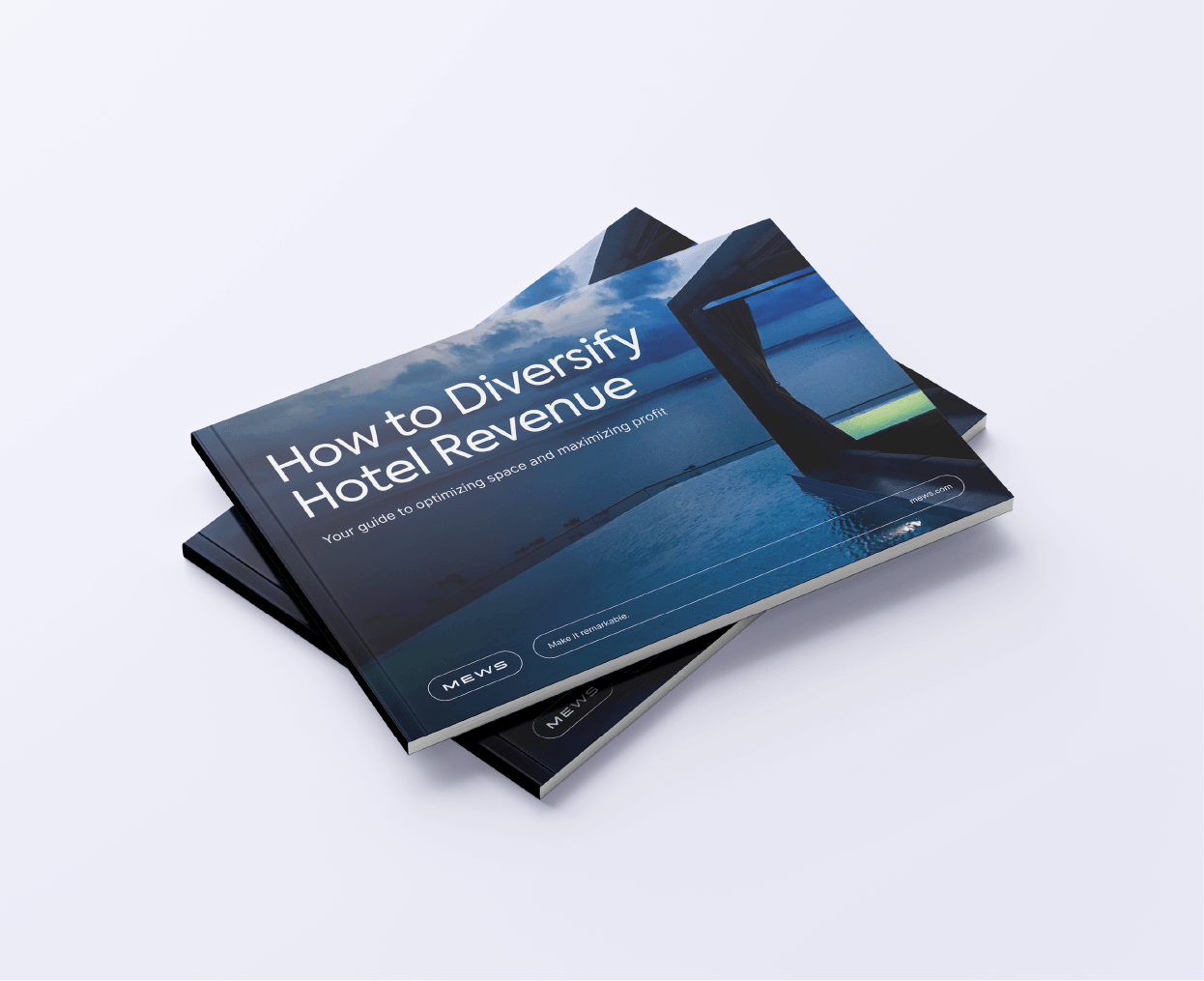Hotel operations are one of the most fundamental parts of the guest experience. From the moment a guest walks through the doors to the moment they leave, it's the operations that shape how smooth, comfortable and enjoyable that stay is. Whether it's the front desk, food and beverage, housekeeping or back-end departments, everything needs to work in harmony to create a seamless experience.
In this guide, we’ll take a closer look at what hotel operations involve, why they’re so critical to business success, and how to manage them effectively across different departments. We’ll also cover the latest technologies that are helping modern hotels operate smarter – and how a platform like Mews can bring it all together.
Table of contents
What are hotel operations?
Hotel operations encompass all the daily activities and workflows that allow a hotel to function smoothly. This includes everything from guest-facing interactions at the front desk and concierge to housekeeping, maintenance, food and beverage, revenue management, HR and finance.
The goal of hotel operations is to ensure that guests receive outstanding service while making sure the hotel runs efficiently and profitably. A coordinated effort across departments, supported by smart processes and tools, helps achieve this goal and enhances both the guest and staff experience.

Why are hotel operations important?
Hotel operations are important because they are essentially the backbone of any successful hotel. Let’s look at some of the top reasons why having consistent operations can boost guest loyalty and your hotel’s reputation.
Guest satisfaction
The more efficient your operations, the more you can positively impact guest satisfaction. The more satisfied guests are, the more likely they are to leave positive reviews, which in turn can translate into repeat business, and more brand advocacy.
Revenue management
If you want to manage bookings, pricing and occupancy rates effectively, then it is critical to have well-functioning operations because this will offer more chances to maximize both revenue and profit.
Controlling costs
When your operations work efficiently, this means you can control costs because you’re no longer wasting time and money on inefficiencies. This in turn helps boost your hotel’s bottom line.
Staff productivity
When your operations run effectively, your staff can perform their duties efficiently, leading to greater job satisfaction. When staff are well-trained, they are more motivated to deliver top-notch guest experiences, which results in lower turnover rates, and better service.
3 main areas of hotel operations
While every hotel is different, operations generally fall into three key categories:
Front desk and guest-facing operations
These are the touchpoints that shape a guest’s first and last impressions. Key tasks include check-in, check-out, concierge services, guest messaging, and responding to guest requests or complaints.
Concierge services play a vital supporting role by providing information about local attractions, making restaurant reservations and helping with any special requests. Room service, restaurant operations and other F&B services also fall into this category, and can significantly boost perceived value.
To streamline these interactions, many hotels use a hotel management software to manage reservations, assign rooms, communicate with guests and automate repetitive tasks. When done right, guest-facing operations create a frictionless experience and help staff deliver truly personalized service.
Behind the scenes
These departments may not be visible to guests, but their impact is massive.
-
Housekeeping ensures rooms are cleaned, stocked and presented to the highest standard – often influencing whether a guest decides to return or leave a positive review.
-
Maintenance teams handle repairs and preventative maintenance tasks to ensure everything from the elevators to the heating system is functioning properly.
-
Laundry services and inventory management for supplies also fall into this category.
These departments rely heavily on internal coordination. Technology can help track and prioritize tasks, reduce communication bottlenecks, and ensure no issue slips through the cracks.
Supporting functions
In addition to guest-facing and operational departments, there are key support functions that play a critical role in overall performance.
-
Revenue management is responsible for optimizing pricing strategies based on demand forecasting and market trends. Using the right tools and data, revenue managers can increase occupancy and maximize profitability.
-
Human resources manages recruitment, staff training, scheduling and retention – all essential for maintaining service quality, especially during busy periods or labor shortages.
-
Marketing and sales help promote the hotel, attract new guests and stay ahead of trends. Whether it’s social media, partnerships, or corporate deals, their work supports both revenue and reputation.
-
Finance oversees budgeting, cost control, financial reporting and forecasting, helping the hotel stay sustainable and scalable.
Why are operations important in hotel management and for business success?
Every touchpoint in the hotel journey is powered by operations — and when any part of that chain is broken, the guest experience suffers. Seamless operations allow hotels to consistently deliver on promises, adapt to guest expectations and stay competitive in a fast-moving market.
Operations also have a direct impact on profitability. Well-managed teams and efficient processes can lead to better cost control, smarter resource allocation and higher guest retention. Add to that the long-term benefits of positive comments on hotel review sites and brand loyalty, and it’s clear that great operations drive business success.
What is hotel operations management?
Hotel operations management is all about overseeing the various departments and making sure they work together efficiently. This responsibility often falls to the hotel general manager or operations director, who ensures the hotel delivers high service standards, maintains profitability and aligns with strategic goals.
This means managing everything from staffing and budgeting to guest feedback and supplier relationships. It also involves using tools and reports to track performance, resolve bottlenecks and make proactive decisions to improve daily workflows.

Best practices for successful hotel operations management
There’s no one-size-fits-all formula for running hotel operations, but some best practices can go a long way:
Establish feedback loops
Regular guest feedback – both during and after the stay – is essential. Use surveys, reviews and on-site feedback to identify weak spots and turn negative experiences into improvements. You can discover some of the best ways to collect guest feedback here. Internally, host weekly staff meetings to problem-solve as a team and improve collaboration.
Provide ongoing training
Well-trained staff are confident, capable and more motivated. Offering regular training sessions helps staff stay sharp, adapt to new technologies and improve their decision-making. Empower them to take initiative and resolve issues independently.
Align revenue strategy with operations
Your pricing strategy should be flexible and based on real-time demand and competitor data. Revenue and operations teams need to work closely so that the hotel is neither under- nor over-staffed and can meet guest expectations profitably.
Automate where possible
Many manual tasks – like assigning rooms, managing housekeeping checklists, and processing payments – can be automated. Automation reduces errors, saves time and allows your team to focus on what really matters: guests.
Protect your brand reputation
Monitor reviews and respond promptly to both positive and negative feedback. Reputation management is not just a marketing function – it’s directly tied to how well your operations are running. A well-run hotel is a well-reviewed hotel.
Key technologies to improve hotel operations management
To provide next-level service and stay competitive, modern hotels rely on technology. Some of the essential tools include:
-
Property Management System (PMS) – the central platform for managing reservations, check-in, billing, reporting and more.
-
Revenue Management System (RMS) – enables dynamic pricing based on demand, seasonality and real-time data.
-
Housekeeping and maintenance apps – allow teams to view, assign and complete tasks in real-time across departments.
-
Mobile and contactless check-in – reduces queues and improves guest satisfaction.
-
Guest messaging and virtual assistants – help deliver instant communication and 24/7 support.
-
Smart room technology – adds personalization and convenience to the guest experience.
How can Mews help your hotel optimize operations management?
Mews brings together all the tools you need in one powerful platform to fully optimize your hotel operations. It supports every team by automating and streamlining daily tasks while improving communication, making it easier to manage housekeeping, front desk, and maintenance workflows efficiently. This reduces manual work and frees up staff to focus on delivering remarkable hospitality.
From the guest’s perspective, Mews elevates the experience with features like mobile and contactless check-in, seamless payments, and instant messaging – all designed to make stays effortless and enjoyable.
As a cloud-native platform, Mews ensures real-time data is accessible anywhere, providing flexibility and up-to-date insights that keep your operations agile and responsive at all times.

5 trends in managing hotel operations
Due to the dynamic nature of the hospitality industry, it’s crucial to stay up to date on the latest trends in order to ensure you’re performing well in the face of the competition.
Using technology to streamline the guest experience
Technology is a major player in managing hotel operations. Things like virtual assistants that can handle guest inquiries and bookings around the clock are a great way to minimize the pressure on the front desk. The Internet of Things (IoT) is another common deployment, allowing guests to control in-room settings without the need for assistance.
Go mobile
Mobile check-in and check-out are another common trend as more and more guests want to manage everything quickly and easily from the palm of their hands. This means that guests are also more likely to use mobile wallets and digital wallets as a payment method, so it will be important to integrate different kinds of payment choices into the guest journey.
Personalization
Personalization and customization within the in-room experience is becoming more and more common, allowing guests to take charge of their hotel stay. Hotels can use tailored recommendations to enhance the in-room experience, taking personalization to the next level.
Flexible and remote spaces
As digital nomads and remote workers begin to call hotels home, guests will seek more flexible hotel spaces where the lobby can double as a coworking area, and high-speed internet is the norm. Consider investing in ergonomic chairs and desks to ensure comfort for this guest profile. Additionally, incorporating staff dedicated to attending to the needs of these digital nomads will be essential.
Robots
Service robots will be the norm, doing tasks such as delivering room service, helping to clean and offering concierge services, which will take the pressure off the different departments that normally would provide these services.
Conclusion
Hotel operations are the foundation of a successful hospitality business. When departments work in sync and processes are clearly defined and supported by the right tools, the result is a smoother guest experience and a stronger bottom line.
Whether you’re running a boutique property or a large hotel group, it pays to regularly review your operations strategy and invest in smart technology that helps your teams do their best work. Because at the end of the day, great operations aren’t just about logistics – they’re what allow you to deliver unforgettable stays.
Download our guide "How to Diversify Hotel Revenue"


2026 Hospitality Industry Outlook
Download now
Table of contents
Hospitality hot takes straight to your inbox



.webp)
